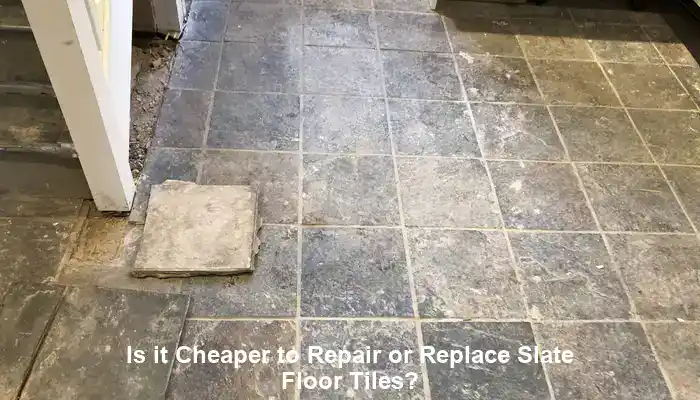
Comprehensive Cost Analysis for Repairing and Replacing Slate Flooring
Understanding the Financial Implications of Slate Flooring Repairs
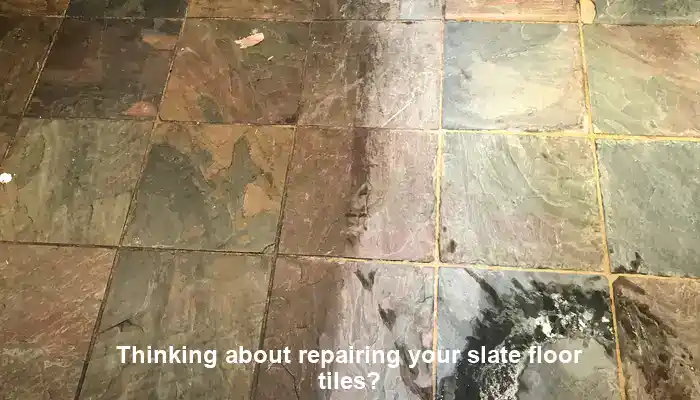
If you are contemplating the repair of your slate floor tiles, rest assured you are not alone. Numerous homeowners encounter this challenge as their stunning slate surfaces begin to deteriorate, whether due to a single chipped tile or hairline cracks that have spread across the flooring. The true costs associated with this decision extend beyond mere financial considerations; they encompass the preservation of your home's unique character while averting larger issues in the future.
In the UK, the costs associated with repairing slate tiles can fluctuate significantly, generally falling within the range of £50 to £150 for minor repairs, such as sealing cracks or replacing individual tiles. This variance is heavily influenced by the rates charged by professional tradespeople and the specific materials selected for the repairs. It is of utmost importance to prioritise quality: specialised sealants and adhesives specifically formulated for slate typically cost between £10 and £30 per container. Selecting the correct products is crucial, as they help protect your flooring for a prolonged period beyond the immediate repair.
Expert Insights: Recommended Products for Effective Slate Maintenance
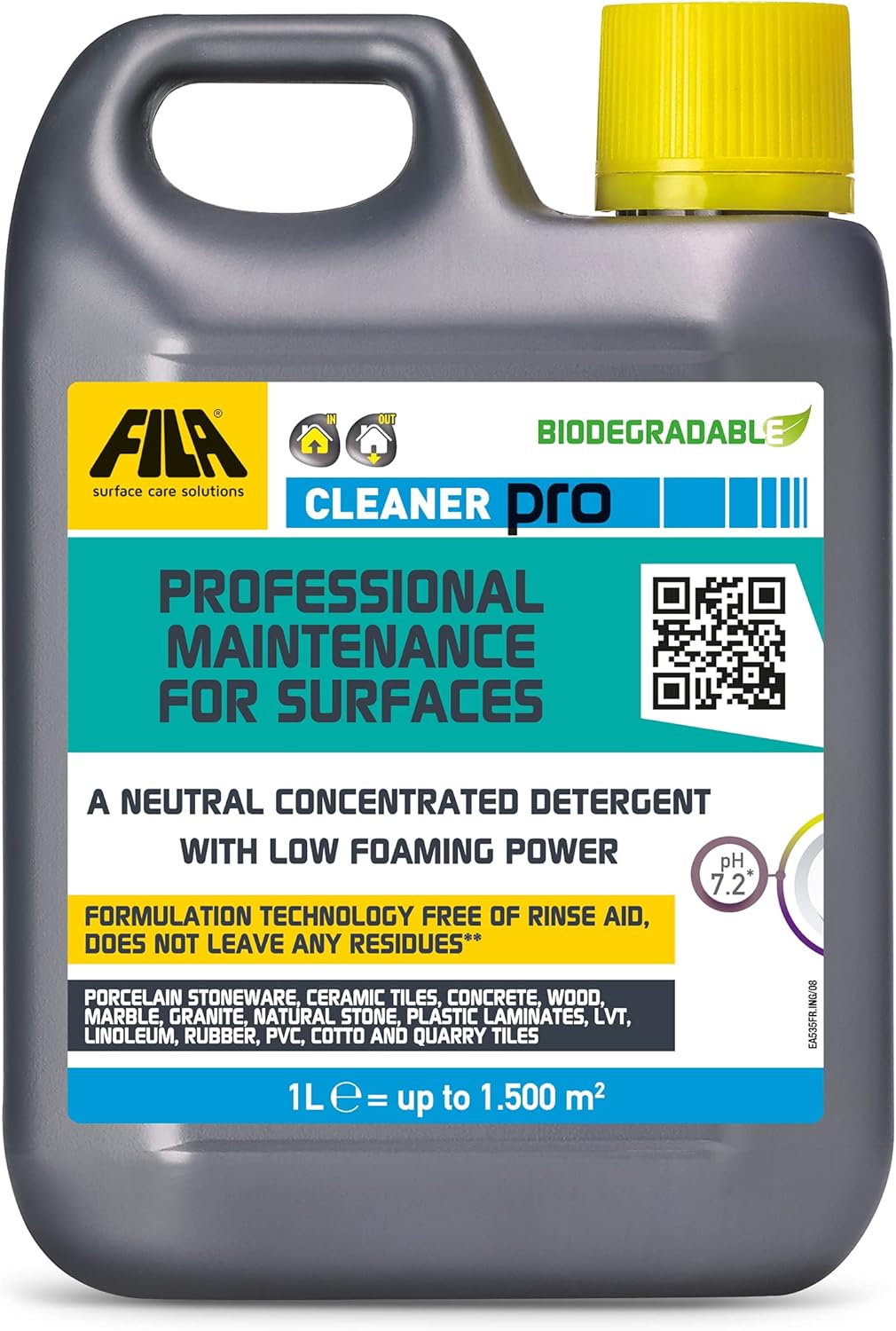
Fila Pro Floor Cleaner
|
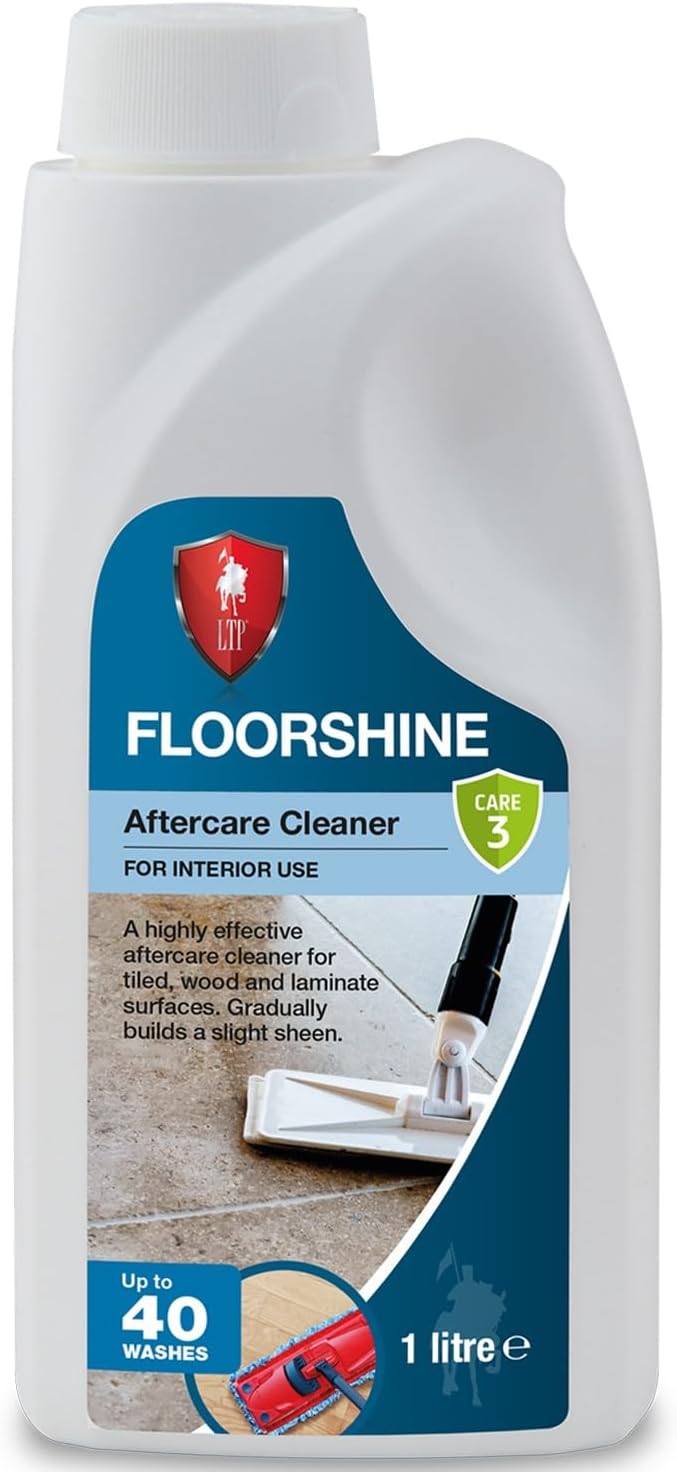
LTP Floorshine
|
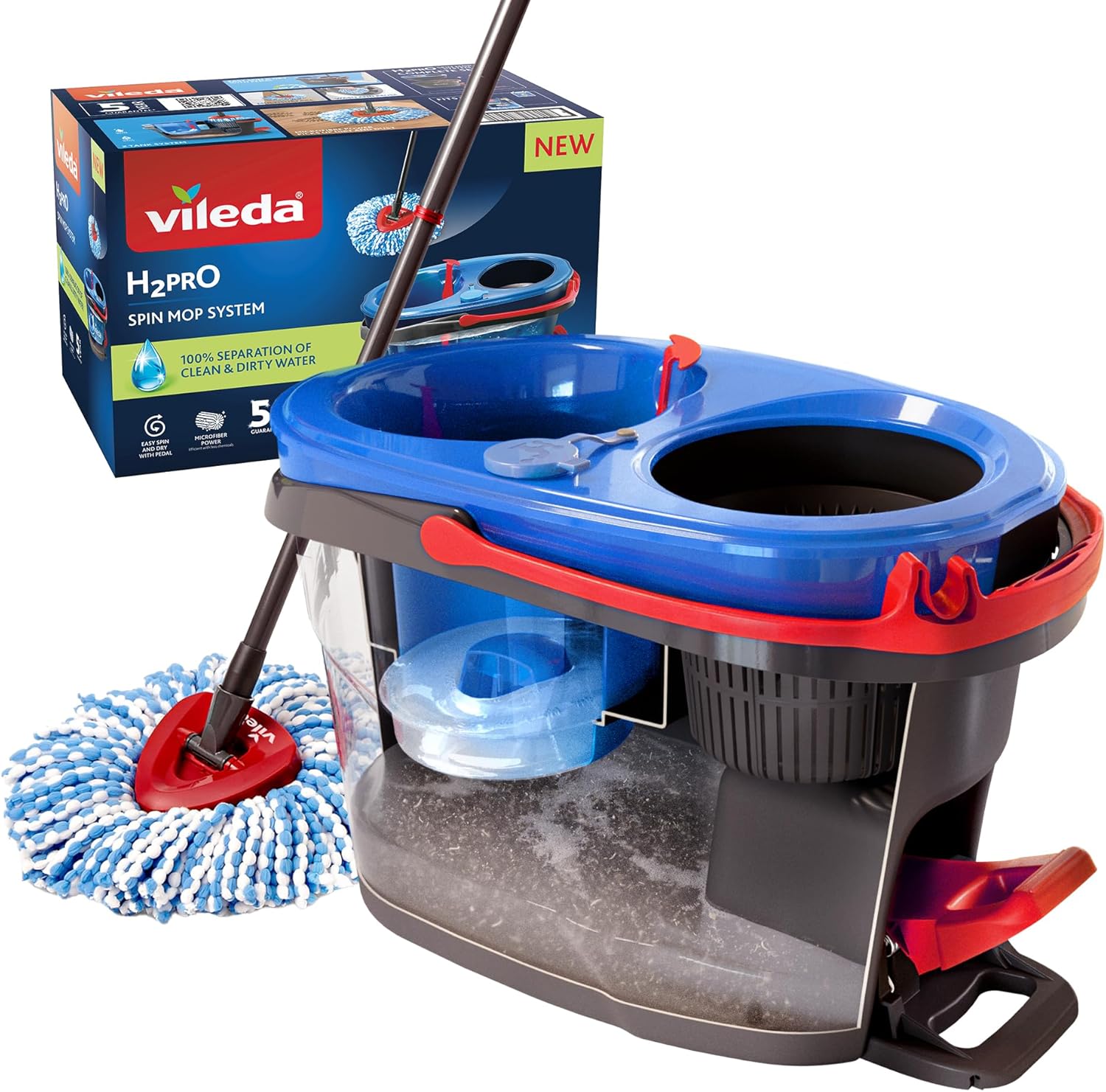
Vileda H2PrO Spin Mop System
|
Labour expenses can also vary considerably. In major urban centres such as Edinburgh and London, skilled contractors might demand rates exceeding £60 per hour. In contrast, rural regions generally offer more competitive pricing, averaging between £40 and £50 per hour. While the allure of DIY repairs may seem appealing for saving costs, it is imperative to acknowledge that fixing slate flooring necessitates a high level of precision. An error with filler or inadequate sealing could exacerbate the damage rather than rectify it.
If your slate flooring holds sentimental or aesthetic significance, investing in professional restoration services can provide reassurance, not only enhancing the visual appeal of the tiles but also ensuring the longevity of the repairs.
Determining the Financial Aspects of Replacing Slate Tiles
Choosing to replace slate floor tiles represents a considerable financial investment—not merely in terms of upfront expenses but also concerning the overall atmosphere and character of your home. Whether you aim to rejuvenate a hallway or infuse new life into a tired kitchen floor, understanding the various cost factors is critical before making any commitments.
The price of slate tiles can vary dramatically. You may discover UK-manufactured tiles priced at approximately £20 per square metre, while premium alternatives, particularly those imported or featuring a high-gloss finish, may exceed £100. Opting for slate is akin to selecting a countertop or carpet: the quality and origin can significantly impact both the aesthetic allure and durability of the flooring.
Installation charges must also be considered. Engaging a professional typically adds between £30 and £60 per square metre, contingent upon the complexity of the task and your geographical location. Should your subfloor necessitate repairs or reinforcement prior to laying the new tiles, this will undoubtedly elevate the total cost, although it is often a crucial step to achieve a reliable finish.
For larger spaces, it might be more economical to integrate the replacement of slate tiles into a more extensive renovation project. Combining tasks can conserve both time and money, particularly if your contractor is already on-site managing other elements of your home.
Although the initial cost of replacement may appear steep, it is vital not to overlook the long-term advantages. Newly installed slate tiles, when executed correctly, can endure for decades with minimal maintenance, ultimately saving you money while providing your home with a refreshed, timeless aesthetic that you will appreciate every time you enter.
Assessing Long-Term Financial Benefits of Slate Flooring Choices
When slate floor tiles begin to exhibit signs of wear or damage, it is entirely natural to ponder: Should I repair or replace? While repairs may initially seem the more budget-friendly option, it is essential to take a step back and evaluate the broader implications, particularly if the damage extends beyond mere cosmetics.
If a cracked tile or uneven area stems from hidden moisture or structural movement, a superficial repair may merely mask the underlying issue. This could lead to further expenses later on if the problem re-emerges. It is comparable to patching a leaking roof; unless the root cause is addressed, those costs will continue to mount.
Although replacement tiles may necessitate a higher initial outlay, they frequently offer substantial long-term benefits. Modern slate typically comes with warranties, and once installed appropriately, they are designed to last. This assurance is invaluable—not only for daily comfort but also if you intend to sell your property in the future. A beautifully installed floor can dramatically enhance your home’s appeal and value.
Furthermore, consider the maintenance requirements associated with each option. Repaired areas may demand ongoing attention, while newly installed tiles—especially those that are well-sealed—usually require less upkeep over time. This difference translates into savings in both time and money, alongside a reduction in everyday hassle.
Thus, whether you lean towards preserving your floor’s original charm or favour a completely new aesthetic, this decision encompasses more than just monetary factors; it is about selecting the choice that will yield the greatest benefit for your home in the long run.
Understanding Ongoing Maintenance Costs for Slate Flooring
When contemplating slate floor tiles, the expenses associated with ongoing maintenance are a critical component of the overall financial equation. Although slate is celebrated for its durability, it still requires a certain level of care to sustain its appearance and functional integrity. Regular cleaning is crucial; employing appropriate cleaning products specifically designed for slate is essential, as harsh chemicals can inflict damage on the surface.
Homeowners should anticipate that the costs related to routine maintenance can range from £50 to £200 annually, depending on the size of the area and the frequency of cleaning. Additionally, resealing the tiles every few years is advisable, with sealants priced between £10 and £40, and application typically necessitating professional expertise, which adds to the total expense.
Conversely, neglecting slate tile maintenance can lead to more extensive repairs or even necessitate complete replacement, significantly escalating costs over time. Therefore, while repairs may seem less expensive in the short term, the ongoing maintenance of both repaired and replaced tiles should always be factored into the overall assessment of whether it is more economical to repair or replace slate floor tiles.
Assessing the Extent of Damage to Slate Tiles
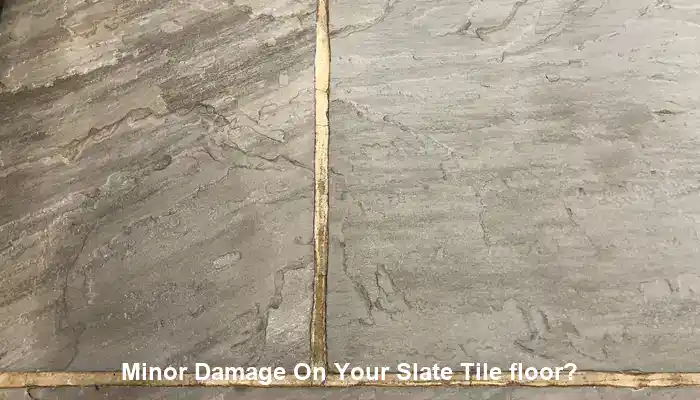
Identifying and Fixing Minor Damage on Slate Tiles
When you notice a small chip or hairline crack in your slate tiles, it is completely understandable to feel uneasy. Fortunately, many of these minor issues can be resolved with relative ease. In fact, addressing minor imperfections often proves to be straightforward and cost-effective, which is a relief when your goal is to maintain your home’s pristine appearance without overspending.
There are accessible solutions available—such as specialised epoxy fillers—that gently seal cracks while seamlessly blending with the natural texture of your slate. Moreover, since minor damage typically does not compromise the structural integrity of the floor itself, extensive work or high material costs are often unnecessary. For those who enjoy a bit of hands-on maintenance, DIY repair kits can be an excellent option, allowing you to save on professional fees while actively participating in your home’s upkeep.
Nonetheless, it is vital to remain vigilant. What begins as a minor imperfection can worsen over time, especially if moisture penetrates. Conducting regular inspections can help you identify minor flaws before they escalate into larger issues. This proactive approach can provide genuine peace of mind.
Ultimately, the decision of whether to repair or replace your slate tiles hinges on the extent and nature of the damage. For minor imperfections, a timely repair can be both practical and reassuring, allowing you to safeguard your home’s comfort and character for many years to come.
Addressing Major Damage to Slate Flooring
When confronted with significant damage, the choice between repair and replacement becomes increasingly intricate. Serious issues such as large cracks, missing tiles, or an unstable floor structure necessitate a comprehensive evaluation of the slate’s condition and the potential implications for your home. Major damage not only detracts from the aesthetic appeal of a space but can also raise safety concerns, particularly in high-traffic areas.
Attempting to repair extensively damaged tiles may not be financially viable. For instance, fixing large cracks might yield a temporary solution that fails to endure, necessitating replacement sooner than expected. In these circumstances, homeowners should contemplate the long-term effects of their decisions. While replacement might require a larger initial investment, it often guarantees a stable and visually appealing floor that will withstand the test of time.
Moreover, if the damage originates from underlying issues such as water infiltration or subsidence, merely repairing the tiles will not address the root cause. Replacement, while initially more expensive, can be viewed as an investment in your home’s overall health. This approach ensures that any underlying problems are resolved, potentially saving homeowners from more significant expenses in the future.
Assessing Aesthetic Factors in Slate Tile Decisions
The extent of damage to slate tiles significantly influences aesthetic considerations. Visually appealing flooring can enhance the overall atmosphere of a home, while damaged tiles can greatly detract from this allure. Homeowners frequently face challenges when deciding whether to repair or replace based on how the damage impacts the overall look of the space.
Minor chips may go unnoticed, allowing for simple repairs to maintain a cohesive appearance. However, when damage is more pronounced, it can create an unbalanced aesthetic that diminishes the charm and value of the home. In such instances, homeowners might opt for replacement to achieve a seamless floor that complements their interior design.
Additionally, the trend towards open-plan living spaces means that floors are often more visible than they might be in traditional layouts. This increased visibility heightens the importance of maintaining an immaculate appearance. Therefore, the aesthetic impact of damaged slate tiles can heavily influence the final decision on whether it is cheaper to repair or replace slate floor tiles.
Investigating Material Availability for Slate Flooring Projects
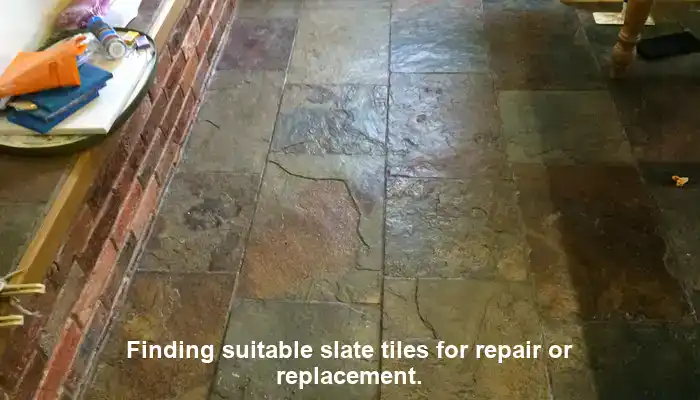
Strategies for Sourcing Suitable Slate Tiles
Finding appropriate slate tiles for either repair or replacement in the UK can significantly influence your decision-making process. Depending on the desired quality and colour, homeowners may need to explore various suppliers, as not all retailers stock every type of slate. Established suppliers in the UK offer a variety of options, but matching existing tiles can sometimes prove challenging.
Local tile shops often carry a selection of standard varieties, but for more unique or premium slate, online retailers and specialised suppliers may be necessary. Online platforms enable homeowners to browse a diverse array of styles and prices, simplifying the quest for the perfect tiles. However, purchasing slate online necessitates caution, as variations in colour and texture can be difficult to assess without seeing the product in person.
Moreover, the costs associated with sourcing materials can greatly influence the overall project budget. Importing tiles may incur additional shipping fees and longer lead times, which could impact the timeline for repairs or replacements. Homeowners should carefully weigh these factors when deciding whether to repair or replace, as material availability can significantly affect their final choice.
Challenges in Matching Existing Slate Tiles
A primary obstacle encountered during slate tile replacements is matching new tiles to existing ones, particularly when dealing with older or discontinued products. If the current tiles possess a specific finish or colour variation, finding an exact match can be arduous, and discrepancies can make replacements glaringly obvious.
To navigate this challenge, homeowners may need to obtain multiple samples from suppliers or even contemplate custom orders, which can lead to increased expenses. Engaging a professional experienced in sourcing matching materials can also streamline this process. These experts often have connections with suppliers and may be able to identify suitable matches that a homeowner might overlook.
Additionally, creative solutions can sometimes be employed to blend new tiles with existing ones. For instance, incorporating a border or using varying tile sizes can create visual interest while helping to obscure mismatches. Ultimately, whether it is cheaper to repair or replace slate floor tiles significantly depends on the ability to effectively source and match materials.
Understanding Lead Times for Acquiring Slate Tiles
The lead time required to acquire slate tiles can greatly influence the decision-making process regarding repair or replacement. In instances where urgent repairs are necessary due to safety concerns or aesthetic issues, waiting for materials can be frustrating. Depending on the supplier’s inventory and the specific type of slate required, lead times can vary from a few days to several weeks.
Homeowners should factor this into their planning, especially if they have a tight timeline for renovations or upcoming events. If repairs are needed immediately, it may be more practical to pursue a repair rather than a replacement, particularly if suitable materials are readily available.
Understanding expected lead times can also assist homeowners in preparing for potential disruptions. If the tiles are sourced directly from overseas, additional shipping durations should also be taken into account. This information can help in making an informed decision regarding whether it is cheaper to repair or replace slate floor tiles, as the urgency of repairs may necessitate a quicker resolution.
Engaging Professional Services for Slate Flooring Solutions
Finding Skilled Slate Repair Specialists
Locating and hiring professionals specialised in repairing slate tiles is essential for ensuring high-quality results. It is imperative to select a tradesperson with experience specifically in slate tile work, as the unique characteristics of this material require a specific skill set and knowledge base. In the UK, numerous companies specialise in tile repair services, offering expertise that can significantly enhance the durability and appearance of repaired tiles.
When searching for repair specialists, homeowners should seek reviews and testimonials from previous clients, providing valuable insight into the quality of service delivered. It is also prudent for professionals to provide references and examples of their past work. Inquiring about warranties or guarantees for their services can offer reassurance regarding the durability of the repairs conducted.
It is important to note that the cost of hiring a professional can vary based on location, with urban areas generally commanding higher rates than rural regions. The average hourly rate for repair specialists can fluctuate between £40 and £80, depending on the scope of the work and the technician’s level of expertise. Engaging a professional can often yield a superior quality finish and may ultimately save you money in the long run by preventing further damage.
Finding Qualified Installation Experts for Slate Tile Projects
Identifying proficient experts for slate tile replacement is just as essential as locating those for repairs. The installation of slate tiles can be a complex process that requires meticulous attention to detail and a robust understanding of the intricacies involved. Professional installers in the UK can provide services that ensure the tiles are laid accurately, which is vital for maintaining the integrity and visual appeal of the flooring.
When seeking installation specialists, homeowners should look for professionals with a strong portfolio of previous work. Seeking recommendations from friends or family can also yield trustworthy leads. Additionally, obtaining multiple quotes can assist homeowners in gauging the market rates for installation services and ensuring they are receiving a fair price.
Installation costs can vary significantly based on the complexity of the project and the type of slate being used. Generally, homeowners can expect to pay between £30 and £60 per square metre for professional installation. However, it is essential to consider the potential costs of rectifying poorly laid tiles, which can far exceed the initial savings associated with choosing an inexperienced installer.
Comparing DIY Options with Professional Services
When weighing the option of DIY repairs and replacements against hiring professionals, homeowners must carefully evaluate the pros and cons of each approach. Opting to carry out the work themselves could lead to substantial savings on labour costs. However, slate is a material that requires specific handling to avoid further damage, and mistakes can be costly.
For those with experience in DIY home repairs, tackling minor issues can be a feasible and satisfying endeavour. Online tutorials and guides can provide valuable information, empowering many homeowners to successfully repair or replace tiles. However, for extensive damage or complete floor renovations, hiring a professional is often the more prudent choice.
Engaging a professional not only assures a higher quality of work but can also save time and effort, allowing homeowners to focus on other priorities. The potential for long-term savings from a well-executed installation can outweigh the initial costs associated with hiring a professional. Ultimately, the decision of whether <a href="https://www.abbeyfloorcare.co.uk/home-garden/tile-care/professional-slate-floor-restoration-expert-techniques/">to repair or replace slate floor tiles</a> will depend on individual skills, the extent of the damage, and available resources.
Leveraging Maintenance Services for Slate Flooring Preservation
Securing professionals for routine slate tile maintenance is crucial for preserving the beauty and longevity of the flooring. Many homeowners underestimate the significance of ongoing maintenance, which can substantially extend the lifespan of slate tiles and deter future repair needs. Professional maintenance services typically encompass deep cleaning, sealing, and inspection of the flooring, ensuring that any potential issues are addressed promptly.
Routine maintenance costs generally range from £50 to £150, depending on the size of the area and the specific services required. Hiring a professional for maintenance not only saves homeowners time and effort but can also ensure a level of quality that may be challenging to achieve through DIY methods.
Moreover, professionals can identify and rectify any early signs of damage or wear, potentially saving considerable expenses in the long run. Establishing a regular maintenance schedule can be an effective strategy for protecting your investment in slate flooring, making it vital to consider these services when deciding whether to repair or replace tiles.
Understanding Warranties and Guarantees for Slate Flooring Services
Investigating the warranties and guarantees provided by professional slate tile services is crucial for homeowners contemplating repairs or replacements. Many reputable contractors offer warranties for both materials and workmanship, providing peace of mind that the work performed is of high quality and that any issues arising shortly after installation will be addressed at no additional cost.
Warranties can vary significantly in terms of length and coverage, so homeowners should ask specific questions about what is entailed. For example, some warranties may cover only particular types of damage, while others provide broader protection against various issues. Gaining a comprehensive understanding of these terms will assist homeowners in making informed decisions when choosing between repair and replacement.
Furthermore, when selecting materials, it is wise to seek manufacturers that offer warranties for their slate tiles. Many reputable brands provide guarantees that can enhance the value of the investment, ensuring that any product defects will be rectified. Therefore, when determining whether it is cheaper to repair or replace slate floor tiles, considering warranties and guarantees plays a crucial role in the overall financial assessment.
Exploring Environmental Considerations in Slate Flooring Decisions
The Environmental Benefits of Repairing Slate Tiles
Examining how repairing slate tiles contributes to environmental sustainability highlights the importance of adopting eco-friendly practices in home maintenance. Repairing existing materials rather than replacing them reduces waste and lessens the demand for new resources. As a natural material, slate is generally durable, but its mining and production processes can significantly impact the environment.
By choosing to repair instead of replace, homeowners can substantially decrease their environmental footprint. This decision aligns with the growing emphasis on sustainability and eco-consciousness in home improvement. Many individuals now prioritise eco-friendly choices, and repairing slate tiles serves as an excellent example of this principle in action.
In addition to minimising waste, repairs typically require fewer materials, leading to lower energy consumption and reduced environmental degradation. For those committed to sustainable living, the choice to repair rather than replace slate tiles can be a meaningful decision that reflects personal values and positively contributes to environmental conservation.
Environmental Implications of Replacing Slate Tiles
Assessing the environmental impact of replacing slate tiles is vital for homeowners considering extensive renovations. Replacing existing tiles generates waste, as old materials often end up in landfills, exacerbating environmental degradation. Moreover, the production of new slate tiles involves mining, which can lead to habitat destruction and increased carbon emissions from transportation.
When contemplating a replacement, homeowners should consider not only the immediate costs but also the broader environmental consequences. Opting for environmentally friendly materials, such as sustainably sourced slate, can mitigate some of these impacts. Additionally, responsible disposal or recycling of old tiles can further lessen the environmental burden, enabling homeowners to make conscientious choices during renovations.
Mindful consumers are increasingly recognising the effects their decisions have on the planet. Thus, weighing the environmental ramifications of both repair and replacement is crucial when determining which option best aligns with personal values and sustainable practices.
Waste Management Approaches for Disposing of Old Slate Tiles
Considering disposal and recycling options for old slate tiles in the UK is essential for homeowners aiming to minimise their environmental impact. Numerous skip hire services provide specific waste management solutions for construction and renovation debris, including slate tiles. However, responsible disposal requires more than merely discarding old materials in a skip.
Homeowners can explore recycling options that allow tiles to be repurposed or reused in other projects. Some companies specialise in reclaiming and recycling slate, providing an eco-friendly alternative to simply discarding old materials. Additionally, local builders or landscaping businesses may have repurposing options for old slate tiles, transforming them into decorative garden features or pathways.
Being proactive about waste management can significantly influence the environmental impact of renovations. By considering recycling and repurposing, homeowners can contribute to a more sustainable future, reinforcing the decision of whether it is cheaper to repair or replace slate floor tiles based on environmental considerations.
Assessing Time Factors in Slate Flooring Decisions
Estimating Time Requirements for Slate Tile Repairs
Estimating the time required for repairs on slate tiles can significantly impact decision-making. Minor repairs, such as sealing cracks or replacing individual tiles, can typically be completed within just a few hours, making them an attractive quick solution for homeowners wanting to enhance the appearance of their floors efficiently.
However, more extensive repairs may take considerably longer, especially if they require structural considerations or multiple tile replacements. Homeowners should also account for the time needed for adhesives or sealants to cure, which can add an extra day or two to the repair schedule. Understanding the expected repair duration is crucial, particularly for those facing tight deadlines or upcoming events, as it may determine whether a repair is feasible in the short term or if a replacement might be the more suitable option.
When time is of the essence, consulting with professionals can provide detailed estimates on the duration of repairs. Their expertise can help homeowners manage expectations and plan accordingly, ensuring minimal disruption to daily life while addressing the damage effectively.
Calculating Timeframes for Complete Replacement of Slate Flooring
Determining the time required for a comprehensive replacement of slate tiles is another vital consideration for homeowners. The process generally extends beyond the straightforward removal and installation of tiles. Factors such as the need for subfloor repairs, acclimatisation of new tiles, and drying times for adhesives can significantly lengthen the overall timeframe.
A complete replacement project can take anywhere from a few days to several weeks, depending on the area’s size and the complexity of the job. Additionally, sourcing the appropriate tiles may introduce further delays, particularly if they need to be ordered from suppliers or imported from overseas.
Understanding the full scope of the replacement timeline is essential for homeowners, especially when coordinating with other home renovations or family schedules. Effective planning can help minimise disruptions, ensuring that the project progresses smoothly from initiation to completion.
Assessing the Disruption to Daily Life During Repairs or Replacements
Evaluating how the repair or replacement process impacts daily routines is crucial for homeowners. Both repairs and replacements can create significant disruptions, especially in high-traffic areas like kitchens or living rooms. The noise, dust, and restricted access to certain parts of the home can pose challenges, particularly for families or individuals who are living in the space during renovations.
Opting for repairs may result in shorter disruptions compared to full replacements, allowing families to maintain some semblance of normalcy. However, if major repairs are required, the inconvenience can still be considerable. Maintaining open communication with professionals regarding timelines and expectations can help alleviate some of these challenges, providing homeowners with a clearer understanding of what to anticipate.
Homeowners should also contemplate alternative arrangements during the process, such as utilising other rooms or making temporary modifications to their living spaces. Understanding the potential disruptions can inform the decision-making process, helping to ascertain whether it is more cost-effective to repair or replace slate floor tiles, taking into account both convenience and the impact on daily life.
Insurance Considerations for Slate Flooring Decisions
Understanding Home Insurance Coverage for Slate Flooring Repairs
Gaining clarity on how home insurance policies in the UK address slate tile repairs or replacements is an essential step for homeowners. Many policies include coverage for accidental damage, which may apply to instances where tiles are broken or damaged due to unforeseen circumstances. Homeowners should thoroughly review their policy documents to ascertain the specifics of their coverage.
In some cases, homeowners may discover that their insurance covers repairs but not replacements, making it vital to document any damage and report it promptly to their insurer. Consulting with an insurance agent can also provide clarity on any questions and assist in understanding the claims process.
Additionally, homeowners should keep meticulous records of any repairs undertaken, as this documentation can prove invaluable when filing a claim. Understanding the ramifications of insurance coverage can significantly influence the decision of whether it is cheaper to repair or replace slate floor tiles, as financial assistance from insurance may affect the overall costs.
Exploring Manufacturer Warranties for Slate Tiles
Investigating the warranty options available for slate tiles can greatly influence costs and decision-making. Many reputable manufacturers offer warranties that cover defects or faults in their products. These warranties may vary in length and terms, so homeowners should consider these aspects when selecting tiles.
A robust warranty can provide peace of mind, ensuring that if damage occurs due to manufacturing issues, homeowners will not bear the full financial burden of repairs. Moreover, some warranties may mandate specific installation procedures to remain valid, underscoring the importance of hiring qualified professionals for any projects.
Homeowners should diligently review the terms of any warranties prior to making a purchase. Understanding the specifics can help ensure that they choose tiles that align with their needs and expectations while safeguarding against potential future problems.
Navigating Claims Processes for Slate Tile Damage
Understanding the process of making insurance claims for slate tile damage in the UK can often be intricate and time-consuming. Homeowners need to be equipped with comprehensive documentation, including photographs of the damage, receipts for repairs, and any pertinent correspondence with professionals.
When submitting a claim, it’s vital to adhere to the insurer’s specific procedures, which may involve notifying them within a designated timeframe and providing evidence of the damage. Clear communication with the insurance company can significantly impact the success of a claim, ensuring that homeowners receive the necessary assistance without delay.
Additionally, being informed about the claims process allows homeowners to make more educated decisions regarding whether it is more cost-effective to repair or replace slate floor tiles. Understanding the potential for insurance coverage can alleviate financial concerns and serve as a decisive factor in the overall decision-making process.
Addressing Common Questions About Slate Flooring
What is the typical cost of repairing slate floor tiles?
The typical cost for repairing slate floor tiles in the UK generally ranges from £50 to £150, depending on the extent of the damage and the materials required.
Is replacing slate tiles a worthwhile investment?
Replacing slate tiles can be a valuable investment if the existing tiles are severely damaged or outdated, as new tiles often provide enhanced longevity and aesthetic appeal.
What are the best practices for maintaining my slate tiles?
To maintain slate tiles effectively, regular cleaning with suitable products is essential, along with periodic sealing to prevent moisture damage and enhance durability.
Can I perform repairs on slate tiles myself?
Yes, minor repairs can be executed as DIY projects; however, significant damage may necessitate professional expertise to ensure proper handling and a quality finish.
What is the expected lifespan of slate tiles?
With appropriate care, slate tiles can last for decades, often up to 50 years or more, making them a durable flooring option.
Are there environmentally friendly options available for slate tiles?
Yes, many suppliers offer sustainably sourced slate tiles that minimise environmental impact and support eco-friendly practices.
What factors should I consider before replacing slate tiles?
Before replacing slate tiles, evaluate the extent of the damage, costs, aesthetic impact, and the potential need for matching materials.
How can I find a reputable contractor for slate tile work?
To find a reliable contractor, request referrals, read reviews, and examine their portfolio to ensure they possess experience with slate tile installations and repairs.
What types of damage can slate tiles sustain?
Slate tiles can sustain various types of damage, including cracks, chips, and water damage, often resulting from impacts or exposure to moisture.
Is insurance coverage available for slate tile repairs?
Yes, many home insurance policies cover slate tile repairs under accidental damage; however, it’s crucial to review your specific policy for details.
The Article Is it Cheaper to Repair or Replace Slate Floor Tiles first found on https://www.abbeyfloorcare.co.uk
The Article Cheaper Options: Repairing or Replacing Slate Floor Tiles? appeared first on https://fabritec.org
The Article Repairing or Replacing Slate Floor Tiles: Cheaper Options Available Was Found On https://limitsofstrategy.com

